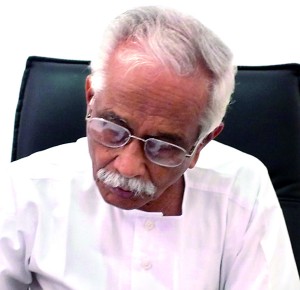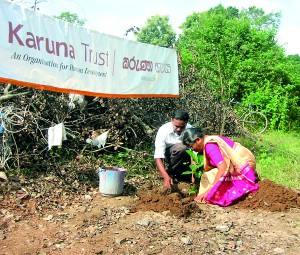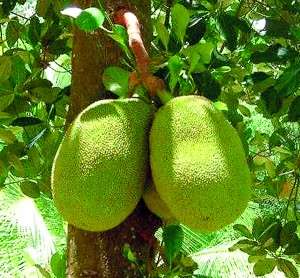Karunaratne, Lankan flag-bearer of the ubiquitous Jakfruit
In the face of fast deteriorating health and behavioural patterns of society, many with common sense now tend to revert to roots to ensure good health and invigorate the rural economy.
One such individual is 80 year-old Mahinda Karunaratne hailing from Habarakada, Galle – a remote village, who has taken upon himself to promote the ubiquitous Jakfruit
A year ago he launched the ‘Jakfruit Project’ that is not only aimed at sustaining good health but also to create an impact on the rural economy.

Mahinda Karunaratne
He studied at the Hikkaduwa Central College (now Sri Sumangala MV) passed his Senior School Certificate (SSC) and in 1950, came to Colombo and tried his hand in several jobs. His last job was at the Ceylon Transport Board (CTB). In his leisure, he used to work in the market and found business is more rewarding than a job.
With some market experience in trade, he bought a small tea business for Rs 3,000 somewhere in 1959. It did well and expanded, also getting his brothers involved in the business. When a former employee from the printing press where his tea company did their printing, came looking for a job, Mr. Karunaratne got this experienced worker to help start and run a printing press.
He thus became one of the best printers in the country and was the first person to purchase an ‘Apple Computer’ from Wijeya Graphics to produce quality printing.
When he handed over his printing business to his children 10 years ago at the age of 70 the assets base of the company was Rs 55 million. It has two printing houses, one in Homagama and the other in Horana.
He wanted one per cent of the income of the company to be donated to the ‘Karuna Trust’ which Mr Karunaratne now heads. The Fund has now swelled into a massive Rs 80 million of which the interest accrued by the fund is used for various social and community schemes, like building houses for the rural poor, offering scholarships to poor children and so many such projects.
Mr. Karunaratne says in Sri Lanka since the ancient times there are two trees that have been able to save the people from starvation – the Jakfruit tree and the coconut tree. Since colonial times coconut tree also became commercial crop.
He said that Jakfruit trees have been felled for timber and they have not been replenished with the danger of extinction. Therefore, he was determined to revive the growing of these trees, educate the people about the nutritional values of the Jackfruit and felt that the best vehicle to propagate this message is through school children.

Senehelatha Karunaratne, wife of Mr Karunaratne plants the first jackfruit seedling at Medawachchiya.
Mr. Karunaratne launched the Jakfruit tree planting campaign around one year ago. He also got a contribution of Rs 1.1 million towards this venture, from the American Buddhist Global Relief Organization towards this project.
His aim is to distribute at least 100,000 Jakfruit plants among the students of rural schools. These plants are of an indigenous species. Improved varieties of Jackfruit trees are dwarf in nature and their life span would be around 15 years, whereas the indigenous varieties would live for ages, and the older the timber the better it is.
So, far around 15,000 plants have been distributed among school children, in Rambuke, Kajugaswatte in Kalawana and in some schools in Anuradhapura. The Forest Department has undertaken to have Jackfruit seedlings nurseries for this purpose and the Sri Lanka Foundation Institute has undertaken the training of school children in leadership to monitor the growth of the plants.
Mr. Karunaratne told the Business Times (BT) that his intention is to set up collection, cleaning and packing centres, where the packed Jackfruit in ready-to- cook form is then sent to the market. It would ensure a ready income for villagers, specially wmen.
He also hopes to set up a Jakfruit dehydration plant in Rambuke, Kalawana. To advance and streamline the Jakfruit project, he recently went on a study tour to Kerala, which is identical to Sri Lanka in terms of vegetation, landscape, etc. Mr. Karunaratne told the BT that in Kerala around 500 metric tonnes of Polos (half matured Jak) is exported each year. In that state Jak collection centres are  maintained and groups of people peal, clean and pack, ready-to-cook Jackfruit and around 2000 kg are dispatched to supermarkets every day.
maintained and groups of people peal, clean and pack, ready-to-cook Jackfruit and around 2000 kg are dispatched to supermarkets every day.
His attempts, Mr. Karunaratne says is to bring the lost pride of ‘Bath Gasa’ – (Rice Tree) and said that eating more and more Jak would make people healthier. On the other hand the production and sale of this fruit would also ensure a good income for the growers, distributors and the sellers which would then be a boost for the rural economy.
Mr. Karunaratne says that planting of more and more trees is environmentally beneficial and when the Jak is mature its timber can be used for construction purposes and furniture.
comments powered by Disqus

